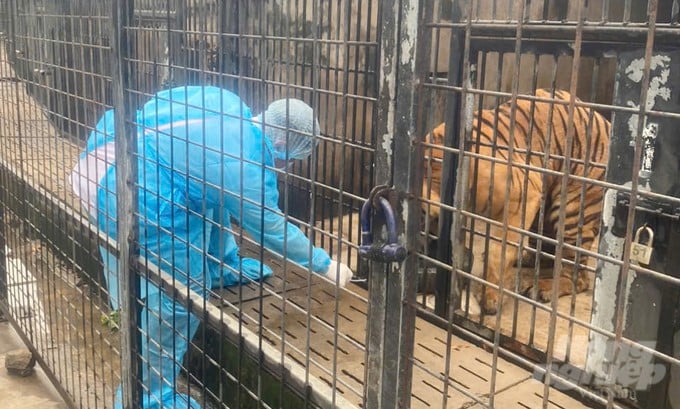May 16, 2025 | 10:39 GMT +7
May 16, 2025 | 10:39 GMT +7
Hotline: 0913.378.918
May 16, 2025 | 10:39 GMT +7
Hotline: 0913.378.918
On the morning of October 31, the Dong Nai Department of Agriculture and Rural Development informed that the outbreak of avian influenza A/H5N1 at Mango Garden tourist area (Bien Hoa city) that killed 20 tigers and 1 leopard was safe and controlled.

A representative of the Department of Animal Health took disease samples at the A/H5N1 avian influenza outbreak in the Mango Garden tourist area. Photo: LB.
In a document sent to the Dong Nai Sub-Department of Animal Husbandry and Veterinary Medicine this morning, the National Central for Veterinary Diagnosis (Department of Animal Health) also confirmed that 40 samples taken from the environment and feces in the outbreak area were negative. These samples are taken from wild birds, chickens, pigeons, the environment where wild animals are kept, and containers.
Thus, the outbreak has passed 21 days from the date the last disease-infected animal died, was destroyed, or recovered without any animal being sick or dying of avian influenza A/H5N1.
Mr. Luong Hai Phong, Deputy Head of Epidemic Prevention Department (Dong Nai Sub-Department of Animal Husbandry and Veterinary Medicine), provided information that since the epidemic broke out, the Mango Garden tourist area has been closed and disinfected daily. The facility has also vaccinated animals susceptible to the disease with the avian influenza vaccine at a rate of 93.7% of the number of animals being vaccinated.
Previously, Mango Garden Ecotourism Area reported that from September 6 to September 22, the disease caused the deaths of 21 wild animals. The cause was determined to be avian influenza A/H5N1.
Immediately, the Dong Nai Department of Agriculture and Rural Development directed the Sub-Department of Animal Husbandry and Veterinary Medicine to coordinate with relevant units in inspecting and handling diseases in wild animals.
The animals at Mango Garden tourist area were also sampled to trace the influenza virus and vaccinated to prevent the spread of the disease. Besides, Dong Nai province's veterinary force also traced risk factors in surrounding areas to promptly control and handle them.
According to Ms. Nguyen Thi Diep, Head of the Epidemiology Department (Department of Animal Health), the results of gene sequencing of the avian influenza A/H5N1 virus on samples from My Quynh Zoo (Long An province) and Mango Garden are 100% similar. This gene is similar to the strain circulating in Cambodia and Laos. Thus, there may have been transmission of avian influenza A/H5N1 between My Quynh Zoo and Mango Garden tourist area.
Mr. Nguyen Truong Giang, Director of the Dong Nai Sub-Department of Animal Husbandry and Veterinary Medicine, assessed that the source of infection could be from wild birds flying into the facility and possibly entering the area where tigers and leopards are kept. Another cause may be the food source for tigers and other carnivores in the tourist area, which are fresh chicken breasts, heads, and necks. Other sources of infection cannot be ruled out from people (including caretakers and tourists) and the facility's vehicles entering and exiting tiger and leopard keeping areas.
Regarding the temporal progress of the disease, the disease was first detected at My Quynh Zoo (August 16), then at the Vuon Xoai tourist area (September 6). "Of which, the source of infection may be from My Quynh Zoo in Long An spreading to the Mango Garden tourist area through the human factor. Because before that, Mango Garden transferred wild animals to My Quynh Zoo, and the tourist area's staff supported the zoo in taking care of tigers, leopards, and lions brought," said Mr. Giang.
The representative of the Dong Nai Department of Agriculture and Rural Development reported to the Dong Nai Provincial People's Committee on successfully controlling the outbreak and asked for further instructions. The Mango Garden tourist area will likely be reopened to stabilize.
Translated by Thu Huyen
![Multi-channel, multi-directional Vietnamese agricultural markets: [7] Deep processing makes global reach easy](https://t.ex-cdn.com/nongnghiepmoitruong.vn/608w/files/huytd/2025/05/16/2946-che-bien-sau-chia-khoa-vang-nang-tam-nong-san-viet-tren-ban-do-the-gioi-080603_110-093858.jpg)
(VAN) The application of deep processing technology is helping Vietnamese agricultural products enhance their value, create competitive advantages, and open doors to conquer global consumers.
![Multi-channel, multi-directional Vietnamese agricultural markets: [6] Agri products go online](https://t.ex-cdn.com/nongnghiepmoitruong.vn/608w/files/content/2024/12/10/1-113313_954.jpg)
(VAN) Bringing agri products onto e-commerce platforms is an effective way to build a brand that many businesses, cooperatives, and agricultural production households are doing.

(VAN) Veterinary training should focus on quality, not just quantity. Veterinarians also need more options to pursue specialized training.

(VAN) The veterinary industry needs to be viewed objectively and further invested in to properly demonstrate its role and importance in the new context.

(VAN) The number of veterinarians graduating each year is not enough to meet actual needs, hence a difficult problem for the growing livestock industry.

(VAN) The strategic partnership between Cambodia, the Philippines, Vietnam, and CGIAR ensures that innovative solutions effectively address national priorities for food system development.

(VAN) This was affirmed by the UK Minister of State at the Department for Environment, Food and Rural Affairs during a working session with Deputy Minister Tran Thanh Nam on May 13.